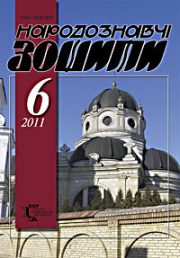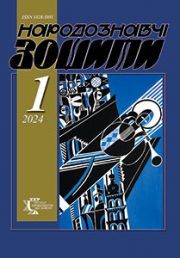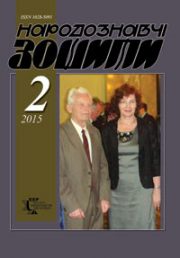The Ethnology Notebooks. 2020. № 5 (155), 1022—1029
UDK 94(477:438)”1944/1946″:341.43
DOI https://doi.org/10.15407/nz2020.05.1022
LESIUK Viktoriia
- ORCID ID: https://orcid.org/0000-0001-8061-5643
- Master of Ethnology and Archeology
- Vasyl Stefanyk
- Precarpathian National University
- Shevchenko Street, 57
- 76000, Ivano-Frankivsk, Ukraine
- Contacts: e-mail: dia_vika@ukr.net
Abstract. Introduction. Due to the gradual improvement of modern Ukrainian-Polish relations, there are still some unresolved questions about conduct and consequences of the deportation of ethnic Ukrainians during 1944—1946. The historical truth on an interstate scale has not yet been definitively established, as the parties are guided only their political motives. Аt the epicenter of the events were ordinary people who least wanted to be in the status of exiles from their native lands.
The purpose of the article is the need to make a holistic picture of the transformational processes in consciousness and everyday life of ethnic Ukrainians under the influence of the deportation of 1944—46.
The research methodology is based on historical, comparative, empirical and retrospective research methods. The scientific novelty lies in the coverage of the problem of adaptation of ethnic Ukrainians in the Soviet lands during their forced eviction from the territory of Lemko region and Nadsyannia (now the territories of modern Poland and Slovakia) described by the deportees themselves.
The source base of this article is the testimony of deported ethnic Ukrainians, which was collected by the author during a field study during 2018—2019 in the Ivano-Frankivsk region (Mariyampil village in Halyts’kyi district, Uhornyky village, Mykytyntsi village and Ivano-Frankivsk city).
Conclusions. This article describes the main aspects of the development and changes in Polish-Ukrainian relations against the background of forced resettlement by Poland and the USSR. In order to comprehensively study these processes, the author conducted field research by interviewing respondents whose memories formed the basis of this scientific work. In the course of the research, we were able to establish that the bitter historical experience certainly left its imprint on the consciousness of deported Ukrainians. This, caused certain metamorphoses in their perception of themselves as victims of other people’s ambitions, and contributed to even greater consolidation of ethnic Ukrainians in order to be recognized as illegally deported at the state level.
Keywords: deportation, Lemko region, Nadsyannia, memories, history.
Received 25.09.2020
REFERENCES
- Dashkevych, Ya. (2008). The «Vistula» action — difficult questions. Ukraina. Nauka i kul’tura, 34, 16—24. Retrieved from: http://dspace.nbuv.gov.ua/bitstream/ handle/ 123456789/40866/03-Dashkevich.pdf?sequence=1 [in Ukrainian].
- Chaplyk, K. (2013). Existence of Lemko migrants in the conditions of modern Ukraine. Kyiv: Dmitry Burago Publishing House [in Ukrainian].
- Krasovs’kyj, I., & Solynko, D. (1991). Who are we, Lemkos. L’viv: Redaktsijno-vydavnychyj viddil oblasnoho upravlinnia po presi [in Ukrainian].
- Tsependa, I.Ye. (2009). Ukrainian-Polish relations 40—50s of the XX century: ethnopolitical analysis. Kyiv: NAN Ukrainy; In-t politychnykh i etnonatsional’nykh doslidzhen’ im. I.F. Kurasa [in Ukrainian].
- Olenych, I. (1992). Lemkovyna’s Fate. L’viv: Kameniar [in Ukrainian].
- Kalakura, O.Ya. (2014). Deportation of Ukrainians and Poles under the guise of a «population exchange» (the 70th anniversary of Lublin agreement). Istorychnyj arkhiv, 13, 39—49 [in Ukrainian].
- Soroka, L.V. (2017). The deportation of the Ukrainians from their ethnic lands in 1947 (for the 70th anniversary of the action «Vistula»). Hileia, 2, 55—59 [in Ukrainian].
- Makar, Yu. (2014). From deportation to deportation. Social and political life of Holms-Podlaskie Ukrainians (1915—1947). Research. Memoirs. Documents (Vol. 2). Chernivtsi: Bukrek [in Ukrainian].
- Voronyj, M. (2018). Plucked from the root. Ivano-Frankivs’k [in Ukrainian].
- Parnachova, N. (2014). Plight of the Ukrainian countrymen in the 50th of ХХ century at the territory of Poland (based on weekly «Our Word»). Hileia, 7, 73—77. Retrieved from: http://nbuv.gov.ua/UJRN/gileya_2014_86_19 [in Ukrainian].
- Halyk, Ya. (2009). Lemkivshchyna — the land of our ancestors. Ivano-Frankivs’k: Misto NV [in Ukrainian].
- Pron’, T. (2019). «Evacuation» — the deportation of the Ukrainian population from Poland to Ukraine in accordance with the agreement between the governments of the USSR and the PR on September 9, 1944. Naukovi pratsi Chornomors’koho derzhavnoho universytetu im. Petra Mohyly kompleksu «Kyievo-Mohylians’ka akademiia». Ser.: Istorychni nauky, 81, 57—62 Retrieved from: http://nbuv.gov.ua/UJRN/Npchdui_2009_94_81_13 [in Ukrainian].
- Savchuk, O. (2012). Own among his own: deportations of Ukrainians from Kholmshchyna and Pidliashshia in 1944—1947. Luts’k [in Ukrainian].
- Lytvyn, M. (2013). Sotsial’no-politychni peredumovy ta naslidky deportatsijnoi aktsii «Visla» 1947. The «Vistula» action — the final stage of the deportation of Ukrainians from Poland. Historical heritage and public consciousness (Pp. 6—24) [in Ukrainian].
- Pron’, T. (2012). The relationship between Ukrainians deported from Poland to Ukraine in 1944—1946, in the triangle «community — power — immigrants». Collection of scientific works of the National Research Institute of Ukrainian Studies and World History (Vol. 39, pp. 101—121) [in Ukrainian].
- Krynyts’kyj, S. (1999). The struggle of the Ukrainian public for the elimination of the consequences of Operation «Vistula»: Action «Vistula» in the context of Ukrainian-Polish relations of the twentieth century. Proceedings of the scientific-practical conference dedicated to the 50th anniversary of the «Vistula» campaign (April 19, 1997). Ivano-Frankivs’k [in Ukrainian].






